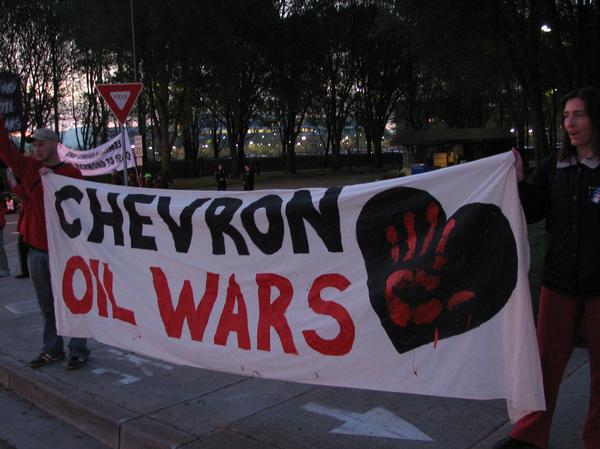No Blood for Chevron.

 On March 15 and 19, Bay Area peace advocates will protest the war in Iraq. As they did five years ago, protesters will focus on the corporations behind the war, including San Ramon’s Chevron Corp., a company whose name most certainly adorns any list of the “winners” of this war and those who most benefit from its continuation.
On March 15 and 19, Bay Area peace advocates will protest the war in Iraq. As they did five years ago, protesters will focus on the corporations behind the war, including San Ramon’s Chevron Corp., a company whose name most certainly adorns any list of the “winners” of this war and those who most benefit from its continuation.
2007 was Chevron’s most profitable year in its 130-year history, garnering the company $18.7 billion in pure profit. According to Forbes, CEO David O’Reilly personally raked in $8.8 million in total compensation in 2006. Over the last five years, he’s received almost $40 million.
No small part of these megaprofits comes directly from Iraq. Chevron hopes that Iraq will soon yield much greater profits. The key to the company’s future success lies in passage of a new national oil law in Iraq and the continuation of the U.S. occupation.
Chevron began marketing Iraqi oil under contracts with the regime of Saddam Hussein in the 1980s and then under the United Nation’s Oil for Food Program in the 1990s. Chevron recently paid $30 million to state and federal regulators to settle charges brought by the Securities and Exchange Commission that it had paid illegal kickbacks to the Hussein regime to win contracts.
Nonetheless, Chevron was one of the first companies to receive marketing contracts following the 2003 invasion of Iraq and continues to market significant quantities of Iraqi oil today. According to the U.S. Department of Energy, Chevron has been refining oil from Iraq at its Richmond refinery since the war began. Rather than use its new profit bounty to upgrade this heavily polluting 106-year-old refinery, Chevron is using its financial and political prowess to try to force Richmond to accept a “retooling” of the refinery to burn dirtier, more polluting, sulphur-rich crude.
While Chevron’s marketing contracts with Iraq yield the company vast profits, the big money — and the company’s big hopes for the future — lies in controlling Iraqi oil under the ground, not just selling it overseas. As then Chevron CEO Kenneth Derr told a San Francisco audience in 1998, “Iraq possesses huge reserves of oil and gas — reserves I’d love Chevron to have access to.” Chevron has found many ways to pursue this goal, particularly following the opening provided by the 2003 U.S. invasion of Iraq.
In October 2003, Chevron Vice President Norm Szydlowski followed in a line of U.S. oil company executives to serve as liaison in Iraq between the U.S. occupation government and the Iraqi Oil Ministry. Chevron regularly co-sponsored conferences, such as “Iraq Procurement 2004 — Meet the Buyers,” at which Iraqi ministers met with corporate executives. Chevron even trained Iraqi oil engineers free of charge in four-week training courses.
In 2004, Chevron co-sponsored a special project of the International Tax and Investment Centre on restructuring Iraq’s economy following the invasion. The ITIC, an advocacy group that advises governments on pro-corporate economic policy, then released a highly influential report detailing the process by which Iraq’s nationalized oil industry could be nearly fully privatized and opened to foreign oil companies. The president of the ITIC, Dan Witt, later boasted on a radio program on which I was also a guest that the ITIC played a significant role in drafting its recommendations into law in the form of the Bush administration’s proposed Iraq Oil Law. The Iraq Oil Law remains one of U.S. government’s benchmarks for Iraq. It would transform Iraq’s oil industry into a privatized model, with at least two-thirds of Iraq’s oil open to foreign-company control under contracts lasting for a generation or more.
Today, the press is widely reporting on Chevron’s ongoing negotiations with the Iraqi government for the Majnoon oil field, one of the largest oil fields in the world. As Chevron tries to lock in the best contract deal possible, the Bush administration continues to press the Iraqis to pass the Iraq Oil Law. Once (or if) Chevron gets its desired Iraqi contracts, it will still need security to get to work: that’s where the U.S. military comes in.
A confidential U.S. government intelligence report on the Iraq Oil Law leaked to ABC News concluded that if “major foreign oil companies” were going to go to work in Iraq, they would need to be “heavily underwritten by the U.S. government.” As General John Abizaid, retired head of U.S. Central Command and military operations in Iraq, recently told a Stanford audience of the Iraq War, “Of course it’s about oil, we can’t really deny that.”
The Iraq war is not just about oil. It is about oil corporations. To end a war for oil, therefore, the role of the oil corporations — not just the U.S. military and federal government — must be diligently exposed and opposed. After five years of spilling blood for oil, enough is enough.
